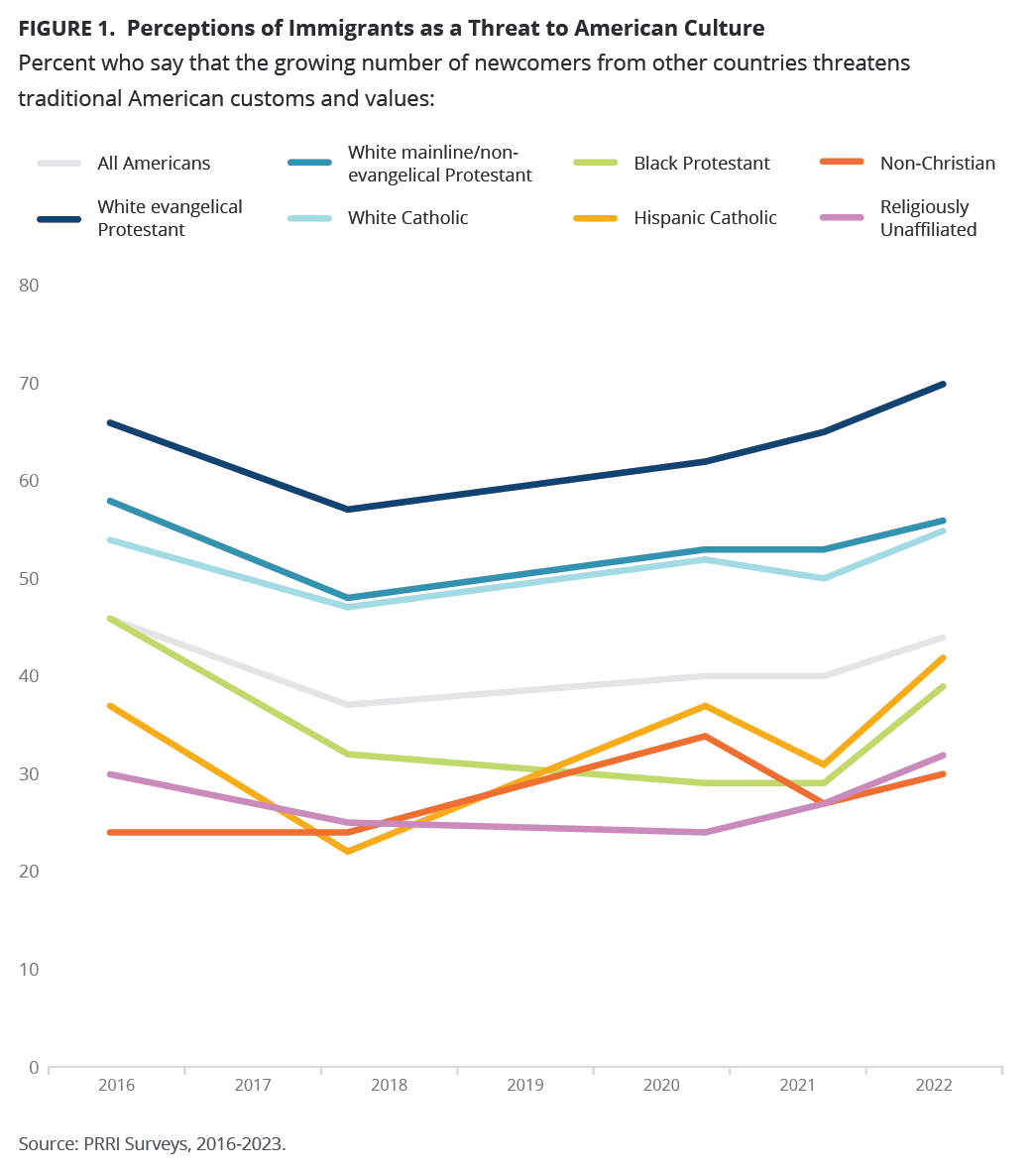Emily Frazier, Ph.D., is an Assistant Professor of Geography at Missouri State University and a 2023-2024 PRRI Public Fellow.
Last month, the Iowa Republican presidential caucus marked what many regard as the official opening of the 2024 presidential election season. As candidates continue to jockey for voters’ support during the crucial primary phase, former President Donald Trump has continued to cater to his long-standing base and has employed nativistic and anti-immigrant rhetoric reminiscent of his previous campaigns. As of January 13, 2024, preliminary polling showed Trump received support from 51% of Iowa evangelicals, significantly more than he drew in the 2016 caucus.
Since 2016, the political leanings of white evangelical Americans have been the subject of much analysis and speculation. Many observers have written about the perceived dissonance between the Christian religious beliefs of evangelicals and the personal and policy positions of a candidate like former President Trump. However, others have argued that Trump’s populist bent on issues such as immigration resonates with deeper issues that data indicate concern the white evangelical demographic, such as cultural replacement, concepts of Christian nationalism, and conspiracy theories. While some evangelical leaders have argued against the conflation of the “evangelical” label with right-leaning, pro-Trump electoral behavior, data from PRRI’s 2023 American Values Survey indicates that together, race and religious affiliation continue to be strong predictors of American attitudes toward immigrants.
In 2016, 46% of all Americans agreed that the “growing number of immigrants from other countries” in the United States represented a threat to “traditional American customs and values.” However, breaking down responses by race and religious affiliation reveals divergent trends among different demographic groups. Those who identify as religiously unaffiliated (30%) and non-Christian (24%) expressed the lowest levels of support for this statement. The highest levels of agreement, meanwhile, appeared among white evangelical Protestants (66%). Although fewer Americans across all religious groups agreed with this statement two years later, in 2018, the percentage of all Americans (37%) who agree has increased. Now, PRRI’s 2023 American Values Survey shows that 44% of Americans say growing numbers of immigrants threaten American customs and values, including the vast majority of white evangelical Protestants (70%).

Since 2016, some evangelical groups have argued that evangelical attitudes toward immigration have significantly shifted, suggesting that this change is due to effective advocacy or learning over time. However, PRRI data collected over the past eight years shows little change concerning perceptions of newcomers to this country as threatening, and more recent data show that white evangelicals hold the most conservative views on immigration policy.
Moreover, the most recent PRRI data shows that solid majorities of white evangelical Protestants show restrictive opinions on immigration policy, including support for:
- Building a wall along the U.S. border with Mexico (80%);
- Passing a law that places stricter limits on the number of legal immigrants coming to the U.S. (63%);
- Passing a law that prevents asylum seekers from coming to the U.S. if they have not first sought protection in some other country (60%), and;
- Passing a law to prevent refugees from entering the U.S. (56%).
Nearly three in four white evangelical Protestants (74%) even support extreme policies such as installing physical barriers that act as deterrents such as walls, floating barriers in rivers, and razor wire to prevent immigrants from entering the country illegally, even if the barriers endanger or kill some people.
These findings suggest that anti-immigrant and pro-nativist policy positions will continue to resonate with voters across this demographic in line with their attitudes on immigration. Trump’s campaign is likely to continue receiving support from white evangelicals at high levels as immigration remains a key campaign issue this fall, particularly as the so-called “crisis” at our Southern border propels immigration as a salient election issue.